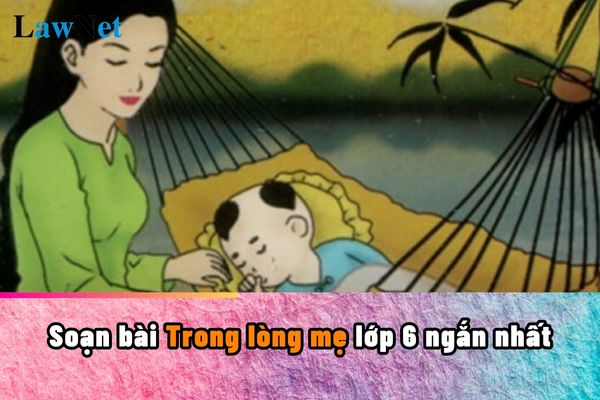What are guidelines on preparing the lesson "Trong lòng mẹ' for grade 6 students in Vietnam? Is cheating in studies a prohibited act for grade 6 students in Vietnam?
What are guidelines on preparing the lesson "Trong lòng mẹ' for grade 6 students in Vietnam?
"Trong lòng mẹ" is part of the curriculum for grade 6 students in the subject of Literature.
Students can refer to the following guidelines on preparing the lesson "Trong lòng mẹ' for grade 6 students:
|
Guidelines on preparing the lesson "Trong lòng mẹ' for grade 6 students 1. Emotions of the character "tôi": Comparing the feeling of meeting his mother to the image of a transparent stream in the desert helps readers vividly imagine the character's longing for maternal love. The personification of the mother's image helps readers feel the warmth and closeness of maternal love. Onomatopoeic words create vivid, evocative images that help readers easily visualize and feel the emotions of the character. |
*Note: The above information is for reference only./.

What are guidelines on preparing the lesson "Trong lòng mẹ' for grade 6 students in Vietnam? Is cheating in studies a prohibited act for grade 6 students in Vietnam? (Image from the Internet)
Is cheating in studies a prohibited act for grade 6 students in Vietnam?
Pursuant to Article 37 of the Charter of lower secondary schools, upper secondary schools, and schools with multiple levels of education issued by the Ministry of Education and Training attached to Circular 32/2020/TT-BGDDT, the acts that students are not allowed to do the following acts:
[1] Insulting the dignity and honor, infringing on the bodies of teachers, staff, employees of the school, others, and other students.
[2] Cheating in studying, testing, examination, and enrollment.
[3] Buying, selling, using alcohol, tobacco, intoxicants, other stimulants, fireworks, and explosives.
[4] Using mobile phones, other devices while studying in class not serving the purpose of studying and not allowed by the teacher.
[5] Fighting, causing disorder and security in school and public places.
[6] Using, exchanging cultural products with violent or obscene content; using toys or playing games that are harmful to one's healthy development.
[7] Students must not commit other prohibited acts according to the law.
Thus, according to the above regulations, cheating in studies by grade 6 students is one of the prohibited acts.
Is respecting parents a duty of grade 6 students in Vietnam?
According to Article 34 of the Charter of lower secondary schools, upper secondary schools, and schools with multiple levels of education issued by the Ministry of Education and Training attached to Circular 32/2020/TT-BGDDT, the obligations of students are as follows:
[1] Perform the tasks of studying and training according to the program and educational plan of the school.
[2] Respect parents, staff, teachers, school employees, and elders; foster mutual help in study, training; comply with the school charter, regulations; abide by state laws.
[3] Exercise, maintain personal hygiene.
[4] Participate in collective activities of the school, class, Ho Chi Minh Young Pioneer Organization, Ho Chi Minh Communist Youth Union; assist families, engage in social labor and activities, protect the environment, adhere to traffic safety.
[5] Maintain and protect school and public property; contribute to building, protecting, and promoting the school's tradition.
Thus, according to the above regulations, respecting parents is also one of the duties that grade 6 students must adhere to.

